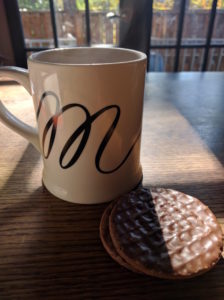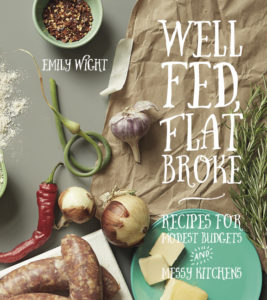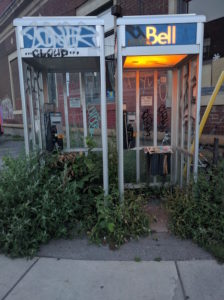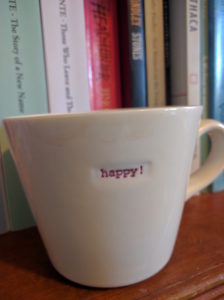October 13, 2016
On Blogs and Food Blogs: a Conversation with Emily Wight
 Emily Wight is author of the cookbook, Well Fed Flat Broke, which is the cookbook that taught me what people are talking about when they talk about reading cookbooks for pleasure. She is also the longtime writer behind the blog of the same name, and I really admire her work and her perspective on blogging.
Emily Wight is author of the cookbook, Well Fed Flat Broke, which is the cookbook that taught me what people are talking about when they talk about reading cookbooks for pleasure. She is also the longtime writer behind the blog of the same name, and I really admire her work and her perspective on blogging.
I’d always wondered if my own philosophy of blogging (that blogging should be easy, fit nicely into your life, never be a chore…) was relevant to food blogging. Emily was kind enough to answer my questions about food blogging, and blogging in general, and what it means to be an old school blogger still at it in 2016.
*****
Dear Emily,
I really admire your blog, your book, and all you do, and it occurs to me that you might the perfect person for something I’ve been wanting to do for a while. I teach a blogging course at UofT and think about blogging a lot, have all kinds of theories about blogs as a radical space, for women in particular. and how blogs have certainly been hijacked by commercial interest. My favourite thing about blogs is there inherent messiness, how they’re works in progress, an exercise in making it up as you go along…
But I also know that this doesn’t quite work for food blogs. A lot of work is required for a food blogger. Whereas I see a blog as a great place to practice the art of imperfection, a food blogger has to get it right or else she’ll be messing up her readers’ dinners. There is also the nature of sponsorship…
Anyway, I would be really interested in reconciling my own ideas about blogging with the realities of food blogging and expanding my understanding of blogging in general. Would you be willing to engage in a back and forth email conversation over a few days to get some of these ideas flowing?
**
 EMILY
EMILY
I’d be happy to help! But also food blogs can be messy and alive, it’s just harder to find them now. I really like Poor Man’s Feast and The Yellow House, but to be honest I’ve really moved away from reading a lot of food bloggers. By the time fall comes, I never want to see another recipe for squash soup as long as I live. I think the “why” behind food blogging has shifted from when I started one million years ago in 2007/08, certainly.
**
KERRY
Okay, so here is my first question. My whole deal is that blogging should be easy, it shouldn’t be a chore. If blogging is hard and taking up too much time, I preach, then you’re doing it wrong. But with food blogging—I suspect and as I’ve been told—there is recipe testing required, you can’t do typos (or else you can end up with a tablespoon of salt when it should have been a teaspoon). It’s a whole different game. Not to mention staging required for photographs… Has this been your experience? Is food blogging inherently hard? Is there a way to fit food blogging sustainably and easily into one’s life?
**
 EMILY
EMILY
I don’t think food blogging is inherently hard—I have a much easier time of it than something like, say, fashion blogging, because I understand food but clothes remain a mystery to me. In most food blogging, food is the creative outlet—it’s a kind of art of its own, and so blogging about food is really just communicating a different form of expression, if that makes sense?
I think that people get satisfaction from different parts of it. I’m not a great photographer, so for me the staging and photographing is an afterthought, because no amount of effort in that regard is going to make my crappy iPhone photos significantly better; I think I’m a decent writer though, so I hope to coast on the quality of the writing and the recipes. For other people who are perhaps better photographers, maybe the writing feels hard.
In terms of accuracy and recipe development, that is a unique challenge but again I’d liken it to its own art form. Like, why would anyone do this if they weren’t either creating or archiving something? For me food blogging made sense—my education is in creative writing, but I am most excited about food, and we have to eat anyway. Food blogging became a way to write every day, or at least fairly often at a time when I might not have known what else to write about.
“Food blogging became a way to write every day, or at least fairly often at a time when I might not have known what else to write about.”
The challenge of sustainability now, I find, has less to do with the form and more to do with my own motivation. There’s a lot of “content” out there. I recognize that this is my own problem—food blogging is very different in 2016 than it was in 2008, and there are so many new voices that it can be hard to wade through and find your people. I won’t read on if I feel like a blogger is writing sponsored content, which is perhaps unfair, but again there is just so much out there now that I get to choose not to be marketed to if I don’t want that. At this stage, I am really looking for writers who make me look at food differently, or who use food as a vehicle for a larger story, whether there’s a recipe at the end or not.
**
 KERRY
KERRY
So interesting. I am also really invested in the idea of blogging as a process, and a never-ending one too. An opportunity to learn and grow. That is why I started blogging about books back in 2007ish. Which is definitely at odds with the way that most bloggers these days are urged to position themselves as experts and gurus. I feel like we don’t get to see any of the process anymore, that the process is regarded as mess, something to be swept into the corners.
Did you have any food blogger “credentials” when you started blogging back in the day? Were they even necessary? You talk about motivation for food blogging—do you think people blogging in 2016 are blogging for blogging’s sake, or are they blogging with the intention of a book deal or some other professional opportunity? And I want to know also—what motivates you to keep blogging after all this time?
**
 EMILY
EMILY
It’s totally a process! That’s why I don’t delete all my terrible, very bad posts with their clunky writing and hideous photos, because I like the idea that you can follow someone back through their process of growth. I remember when I first discovered The Bloggess in maybe 2009, and she was so funny and wonderful, and I had an evening alone (and no children), so I went all the way back through her archives and marveled at how her voice had strengthened and changed as she worked at it. There’s value in the process, and if nothing else it’s reassuring to be able to go back and see how you’ve evolved.
“I don’t delete all my terrible, very bad posts with their clunky writing and hideous photos, because I like the idea that you can follow someone back through their process of growth.”
I think the difference between then and now is really in how we’ve come to view online writing—the idea of “content” creates this sort of urgency to post regularly, to demonstrate value and expertise and keep people coming back. There has always been talk of “building an audience,” but prior to maybe 2011 the message was “make something valuable and people will come.” I don’t think that’s changed, but social media has really altered how that happens—now you don’t just have to make good blog posts, you also have to market them, and you—that was always kind of the case, but there’s so much more “content” out there now, that you have to put in a lot of effort—on a greater number of platforms—to stand out. If you want to do it well now, you have to think of yourself as a “brand” which honestly just feels so ridiculous. I get it, but I don’t want to do it.
“There has always been talk of ‘building an audience,’ but prior to maybe 2011 the message was ‘make something valuable and people will come.’ I don’t think that’s changed, but social media has really altered how that happens.”
Which is not to say that people who are doing it are doing blogging wrong, it’s just that the culture has changed. It does seem like people spring up fully formed overnight, with these beautiful sites and strong voices, but I wonder if part of that is that these are people who are approaching it with more online experience. When I started, I had had a Facebook account for maybe a year and that’s about it; I think now, for a lot of people, the social and visual aspects of blogging come pretty naturally. The technology is better—everyone has an iPhone now and iPhones take pretty good pictures. Getting to where you can be seen as an expert in whatever you’re doing is not such an investment as it used to be. “Anyone can do it” has turned into “anyone can do it well.”
 I didn’t really have much in the way of credentials when I started, short of a writing degree. But is a writing degree any less a credential than professional cooking experience, if the blog’s audience is the home cook? The people who did really well early on had really strong perspectives—people like David Lebovitz, or Luisa Weiss, or Pim Techamuanvivit (who has since quit blogging). They really created the model for what you see a lot of people doing now, and I think created a sense of what you can do if you do well online.
I didn’t really have much in the way of credentials when I started, short of a writing degree. But is a writing degree any less a credential than professional cooking experience, if the blog’s audience is the home cook? The people who did really well early on had really strong perspectives—people like David Lebovitz, or Luisa Weiss, or Pim Techamuanvivit (who has since quit blogging). They really created the model for what you see a lot of people doing now, and I think created a sense of what you can do if you do well online.
Do people blog just to blog, or do they want something else, like a book deal? I don’t know. I think people sit down and open a WordPress account for the same reason they ever did—a desire to connect, to write, or just to find their people online. But I think there is more of a sense that if this goes well, there are other opportunities in it. People take bloggers more seriously now than they did even a few years ago. You certainly see a lot of blogger cookbooks now, and they are often quite well done (and do very well).
“I think people sit down and open a WordPress account for the same reason they ever did. But I think there is more of a sense that if this goes well, there are other opportunities in it.”
As for me and why I still do it? Well, I certainly do it a lot less than I used to, because now I feel like I only want to write when I have something to say, or a recipe that’s really worth sharing, or to gauge whether what I’m working on is something people want to see more of. With other social media, like Instagram or Facebook, I still feel very connected to my community, so I spend a lot of time on there and other platforms. I treat my site as more of a portfolio—I don’t get paid to write on my blog (I don’t do ads or sponsored posts), but it generates other opportunities. It also allows me to work out my point-of-view a bit, and to figure out what I want to do. I would not have had the opportunity to write the book without the blog; now that I’ve written the book though, the blog is still very important in that it’s a place to dabble and experiment with what I want to do next. It’s a very public way of working shit out for myself. I also get the benefit of feedback—people will make the recipes or comment on the writing, so I know pretty quickly what’s working and what’s not. It’s a hard thing to let go of, especially if you came up in writing workshops and are used to a more collaborative approach to the creative process.
This ended up being a lot of words! In short, I think that blogs are valuable and the evolution and messiness is valuable and we’re in a time of transition, because at this point blogs aren’t going away and also there are always more blogs. But like anything produced en masse, there’s good, meaningful stuff in there and I want to see it, especially if it’s a bit unrefined.
**
 KERRY
KERRY
You are my blogging soul sister! That space to grow and evolve is so essential to successful blogging, I think (and I think a lot of bloggers who head into the gig thinking strategy and imagined outcomes are going to trip up on that). I am curious about your ideas about actually reading blogs. In my course, whenever I ask students what blogs they read, they usually shrug their shoulders and admit, “none!” Which is not to say that nobody reads blogs. I think that lots of people read blogs, but we come to them more laterally. I read food blogs all the time, but usually find them by googling whatever happens to be in my fridge and seeing what recipes result. I used to use a blog reader back in the day, but then Google ended it, and my blog reading was kind of rudderless after that—and I missed blogs. So I actively sought out a blog reader (I use protopage.com) which made reading blogs more of a regular habit. Kind of anachronistic, but I like it old school. I have a small but loyal group of readers who seem to feel just the same (and this is not JUST my mom). Anyway, I am interested in your thoughts on reading blogs and also finding readers. As you said, social media is a huge part of this.
Also, regarding the messiness: do you think it’s just too terrifying for some people to show their mess in public? Is that’s what’s driving the push toward tidy blogs? And by tidy, I mean antibacterial robot blogs? Is the blogger who’s willing to show her process taking risks that might be unwise?
**
 EMILY
EMILY
Ha! I’m glad we’re on the same page, as I often feel like I am a cranky old man about everything and no one understands 😉
Google Reader did kill blog-reading for me, in a lot of ways—remember when you could follow, like, 50 blogs? 100 blogs?! Haha, no. I don’t read a huge number of bloggers, but I have kept up with the ones who tell good stories, or who make me laugh. I love Afroculinaria, and Eating From the Ground Up, and The Pizzle, food-related blogs that offer more than just content. The thing about “content” is it’s stuff meant to fill space. How much of what we’re putting out there is valuable? How much can any one person care about? I know content when I see it, and there’s a real difference between reading something someone put thought and time into and some junk they threw up just to have a post on Tuesdays as per usual, you know? And so, I am reading fewer and fewer blogs. But the ones I am reading, I’m really invested in. Like, I would be genuinely sad if they went away. But you’re right, I don’t think people “read” blogs in the same way that they used to—I agree, I definitely come to blogs more laterally now, and I don’t often click “follow” on the blog when I find someone I like—I find them on Instagram, or on Twitter or Facebook.
I also get to say all that as someone who has been around long enough to not really have to hustle for readers. Do I need more readers? I am sure in terms of marketing books more readers would be valuable, but I am not unhappy with how I am doing, and the amount of traffic moving through the site on a daily basis, even when I don’t post very often. I recognize that the landscape is different now, and I get to be someone with cobwebs and cat hair and it’s, like, my thing. Maybe it’s not that we’re not hustling, we’ve just earned the ability to not have to? Maybe those newbies with their neat presentations and good cameras and shiny websites look at people like us, who have been around a long ass time and don’t feel obligated to bother with Pinterest, with envy?
“Maybe it’s not that we’re not hustling, we’ve just earned the ability to not have to?”
 It might be scarier now to show your mess in public. Mess isn’t marketable, and I think because there are so many blogs out there now, you need to look like you know what you are doing in order to be taken seriously, or at least to be followed by people who don’t care about stuff like messiness and the creative process (which I think is most people). Another aspect of this is that a lot of these blogs are or want to be businesses—and businesses run quite a lot differently than creative projects. I want to say this in a way that doesn’t make me sound like an asshole (because I don’t mean anything offensive by it), but there’s a difference between writers and people who like to write; I think writers, or people who have always written (in the writers-as-artists sense), may value the mess and the show-of-process more than people who like to write but have other ambitions for their blogs. Writers aren’t penalized for having written shitty first drafts (or having evolved through a period of shitty-first-draftyness) because it’s expected, that’s what we do. But bloggers who want to turn blogging into something else, something beyond cookbooks or novels or whatever, maybe they approach it differently, and are more thoughtful about how they present themselves.
It might be scarier now to show your mess in public. Mess isn’t marketable, and I think because there are so many blogs out there now, you need to look like you know what you are doing in order to be taken seriously, or at least to be followed by people who don’t care about stuff like messiness and the creative process (which I think is most people). Another aspect of this is that a lot of these blogs are or want to be businesses—and businesses run quite a lot differently than creative projects. I want to say this in a way that doesn’t make me sound like an asshole (because I don’t mean anything offensive by it), but there’s a difference between writers and people who like to write; I think writers, or people who have always written (in the writers-as-artists sense), may value the mess and the show-of-process more than people who like to write but have other ambitions for their blogs. Writers aren’t penalized for having written shitty first drafts (or having evolved through a period of shitty-first-draftyness) because it’s expected, that’s what we do. But bloggers who want to turn blogging into something else, something beyond cookbooks or novels or whatever, maybe they approach it differently, and are more thoughtful about how they present themselves.
Did you see Luvvie Ajayi’s post on having been blogging ten years? She talks a bit about her process, and she had a few points I liked. This one, on evolution: “This blog has evolved with me. And my changed beliefs, my maturity and my growth as a person can be charted through the last ten years. How you start is not going to be how you continue and finish and that is okay. You are human.”
This resonated, because I think this is what’s been so great about blogging. I started out when I was 25 and still really immature in terms of my voice and my world view, and I am happy I can go back even three or four years and see that I have made progress, and that I am maybe a better version of who I was when I started. And maybe that kind of thing won’t matter to most people, but there’s a vulnerability in not being your tidiest, best-branded self and I think that resonates with the kind of readers who will stick with your writing long-term.
Follow Emily Wight on Twitter and Instagram, and stop by to read her blog.





